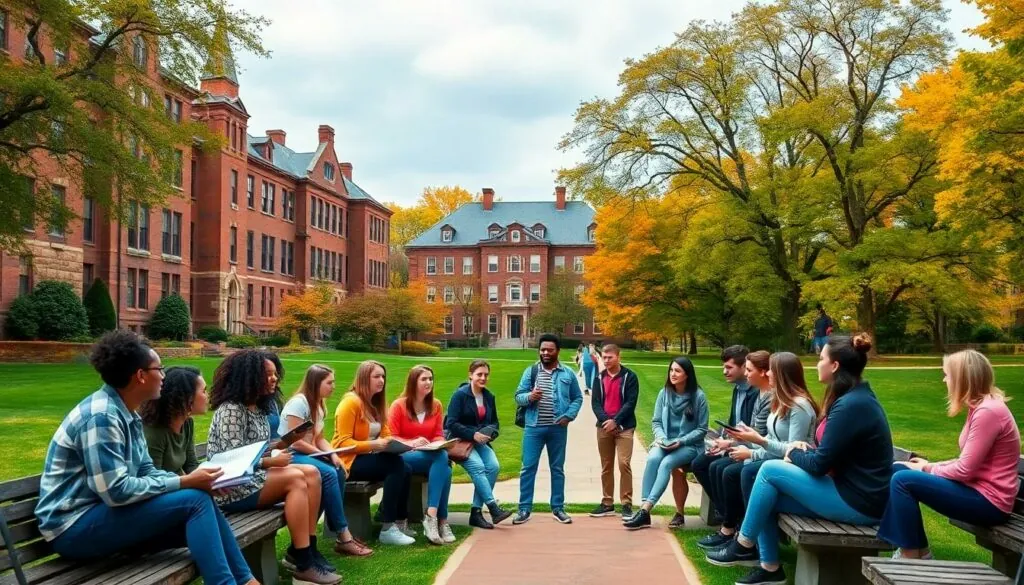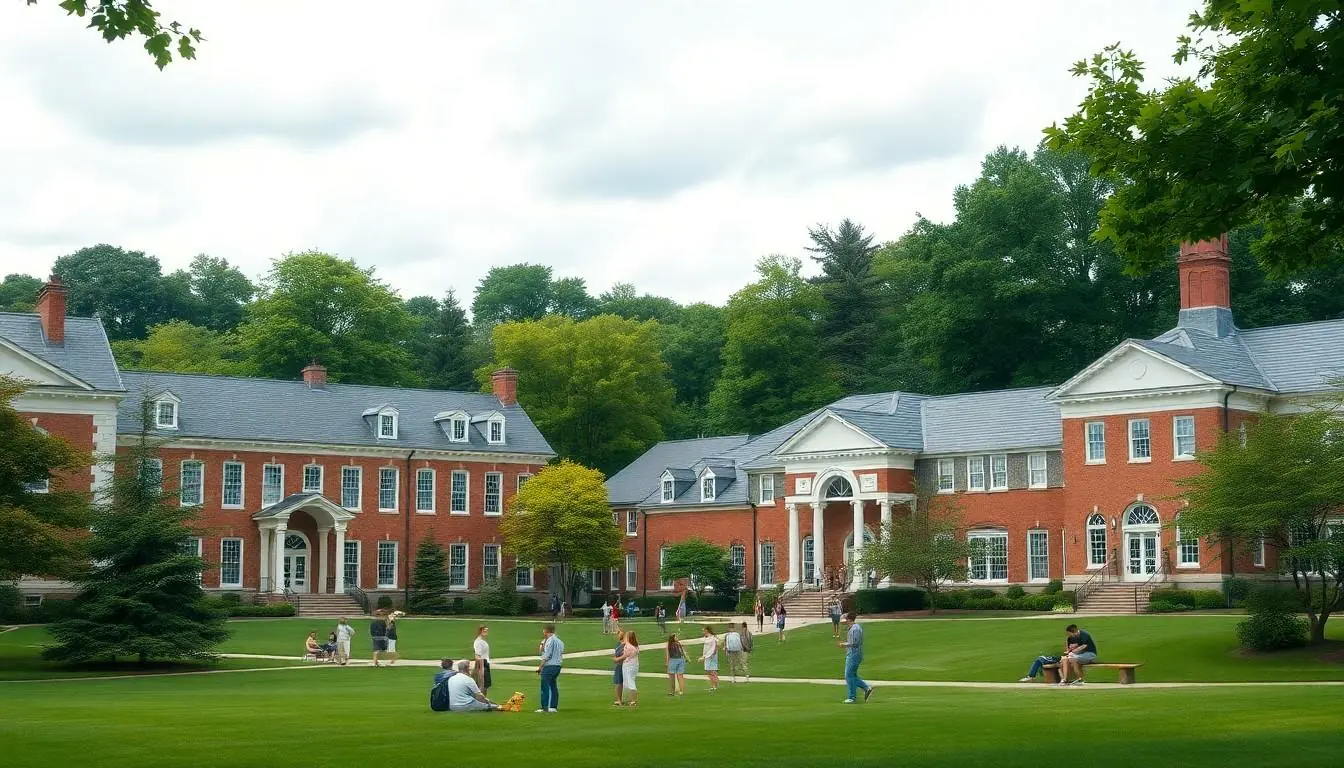Table of Contents
ToggleNestled in the charming town of Hillsdale, Michigan, Hillsdale College has become a beacon of classical education and conservative values. But how did this little gem come to be? The story of its genesis is as fascinating as the curriculum it offers. Founded in 1844, it’s not just a college; it’s a mission to revive the principles of liberty and self-governance.
From its humble beginnings, Hillsdale has grown into a powerhouse of intellectual thought, attracting students eager to challenge the status quo. With a unique blend of rigorous academics and a commitment to the Constitution, it’s no wonder this college has gained a reputation that stretches far beyond its picturesque campus. So buckle up as we dive into the captivating origins of Hillsdale College, where tradition meets innovation in the most delightful way.
Overview of Hillsdale College Genesis
Hillsdale College’s history traces back to its establishment in 1844. The founders sought a unique educational model focused on classical learning and conservative principles. This commitment to academic rigor fosters an environment where students critically examine modern and traditional ideas.
Hillsdale puts a strong emphasis on the U.S. Constitution. Courses and programs reflect this focus, preparing students to engage with principles of liberty and self-governance. The college’s curriculum centers on a Great Books education, allowing students to explore foundational texts across various disciplines.
Campus life at Hillsdale encourages involvement in various student organizations. These groups promote discussions on political theory, philosophy, and economics, enhancing the educational experience. The active campus environment nurtures leadership skills and civic engagement among students.
Hillsdale College also maintains a strict policy against federal funding. By avoiding this funding, the college preserves its academic freedom and independence. This decision reinforces the institution’s dedication to its founding values, allowing it to offer an education rooted in its vision.
Reputation plays a crucial role in Hillsdale’s identity. The college has gained acclaim for its steadfast commitment to academic excellence. Rankings from organizations, like U.S. News & World Report, often highlight Hillsdale as one of the top liberal arts colleges in the nation.
Hillsdale College represents a blend of tradition and modernity. Its focus on classical education, civic responsibility, and independence distinguishes it from other institutions. The distinct approach attracts students who seek a transformative educational experience grounded in core American principles.
Key Features of Hillsdale College Genesis
Hillsdale College Genesis embodies a rich educational philosophy focused on classical learning and conservative values.
Curriculum Highlights
This curriculum includes a Great Books program, allowing students to study foundational texts from various disciplines. Exposure to classic literature, history, and philosophy fosters critical thinking skills essential for intellectual growth. Courses in political theory and economics integrate contemporary relevance with timeless principles. Faculty prioritize engaging discussions, sparking lively debates among students. Each class emphasizes Socratic methods, encouraging deep analysis and personal exploration. Students appreciate the thorough grounding in Western heritage, which shapes their understanding of liberty and governance. Opportunities for interdisciplinary studies further enrich the academic experience, producing well-rounded graduates prepared for diverse careers.
Student Experience
Engaging with student organizations forms a vital part of campus life at Hillsdale. Various clubs and societies give students chances to explore interests in politics, philosophy, and the arts. Involvement often leads to leadership roles, helping to develop essential skills important for future careers. Regular campus events facilitate dialogue on contemporary issues, enhancing the educational environment. Community service is encouraged, reinforcing commitment to civic responsibility. Students express pride in their academic independence, facilitated by the college’s policy against federal funding. Connections among peers cultivate lasting friendships and a supportive network, enhancing the overall college experience.
Comparison with Other Educational Programs
Hillsdale College provides a unique educational environment. It emphasizes classical education and fosters critical thinking through a curriculum rooted in the Great Books tradition.
Unique Selling Points
Hillsdale’s commitment to a liberal arts education sets it apart from many institutions. Programs across disciplines are designed to engage students with foundational texts, enhancing analytical skills. Faculty members employ Socratic methods to provoke thought and discussion. This approach encourages students to explore ideas deeply rather than passively absorb information. Civic engagement is integral, with opportunities for service and discussions on contemporary issues. Additionally, the college’s independence from federal funding supports its mission to uphold academic freedom. Many students appreciate this autonomy, which cultivates an environment for genuine intellectual exploration.
Areas for Improvement
While Hillsdale excels in many areas, some aspects could benefit from enhancement. The college’s focus on traditional values may not appeal to every prospective student. Diversity of thought and experience can sometimes appear limited in a homogenous environment. Expanding offerings in modern disciplines could attract a wider student demographic. Support services for non-traditional students may require bolstering. Accessibility to resources might improve the overall experience for these individuals. Furthermore, developing partnerships with various industries could enrich internship and career opportunities for graduates.
Impact on Students and Community
Hillsdale College positively impacts both its students and the surrounding community. Students engage deeply with classical texts in a curriculum designed to foster critical thinking. Academic independence thrives as the college refuses federal funding, ensuring robust intellectual freedom. Faculty members emphasize Socratic methods, encouraging spirited debates that enhance students’ understanding of complex ideas.
Leadership skills grow through participation in numerous student organizations focused on political theory, philosophy, and the arts. Regular campus events spark discussions on contemporary issues, helping students develop civic engagement. Service to the community further reinforces a commitment to social responsibility, promoting an active, involved student body.
Supportive networks form among peers, fostering camaraderie and long-lasting friendships that enhance the college experience. Graduates enter diverse career fields thanks to the rigorous academic foundation provided at Hillsdale. Hillsdale also cultivates a unique culture that celebrates traditional values while addressing modern challenges.
The college’s commitment to liberal arts education attracts students seeking a transformative experience rooted in American principles. Enhanced focus on partnerships with industries can create more internship and career opportunities for graduates. Fostering a greater diversity of thought and experience represents a crucial area for future growth. By addressing these aspects, Hillsdale College positions itself as a dynamic institution prepared to shape future leaders.
Conclusion
Hillsdale College stands as a beacon of classical education and conservative values. Its dedication to fostering critical thinking and civic responsibility prepares students to navigate a complex world. The college’s unique approach to learning not only emphasizes foundational texts but also encourages spirited discussions that shape well-rounded individuals.
As Hillsdale continues to evolve, its commitment to academic freedom and independence remains a cornerstone of its identity. By addressing areas for growth and enhancing its offerings, the college is poised to further enrich the educational landscape. The vibrant community and supportive networks created on campus will undoubtedly continue to empower future leaders.








